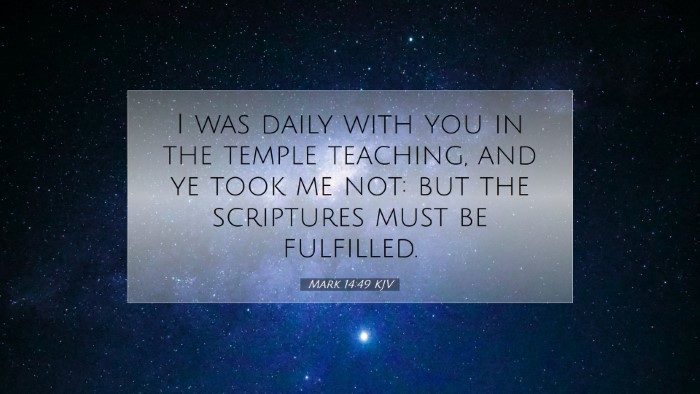Commentary on Mark 14:49
Verse Text: "I was daily with you in the temple teaching, and ye took me not: but the scriptures must be fulfilled."
Contextual Background
The setting of Mark 14:49 occurs during the betrayal of Jesus by Judas Iscariot and His subsequent arrest in the Garden of Gethsemane. This is a pivotal moment leading up to the crucifixion. The verse speaks to the culmination of Jesus’ ministry and the fulfillment of prophetic scripture.
General Themes
- Fulfillment of Prophecy: Jesus points out that His suffering is not unexpected; rather, it aligns with the scriptures.
- Public Ministry: The mention of being daily in the temple illustrates His openness and the public nature of His ministry.
- Rejection and Betrayal: Despite His teachings and miracles, He faces abandonment and betrayal from those He came to save.
Commentary Insights
From Matthew Henry
Matthew Henry highlights the significance of Jesus being “daily” with the people in the temple. It reflects His dedication to teaching and His continual presence among His followers. Henry emphasizes that this accessibility of Jesus contrasted starkly with the actions of the religious leaders, who were plotting His demise. His statement underscores the willful ignorance of the authorities who chose to ignore His miracles and teachings.
From Albert Barnes
Albert Barnes offers a detailed reflection on the fulfillment of scriptures. He notes that Jesus not only acknowledges His impending suffering but affirms and embraces it as part of God's divine plan. Barnes indicates that the phrase "but the scriptures must be fulfilled" reveals Jesus' understanding of His mission as preordained and necessary for the redemption of humanity. This submission to divine prophecy should bolster the faith of believers, demonstrating that despite appearances, God’s plan is sovereign and unthwarted.
From Adam Clarke
Adam Clarke provides a theological lens regarding the awareness of Jesus about His situation. Clarke comments on the phrase “ye took me not,” elaborating that this not only reflects the populace's general ignorance of His messianic identity but also their apathy. He posits that many who witnessed Jesus' teachings did not recognize Him as the Messiah, further emphasizing the tragic irony that the very Scriptures they revered pointed to Him. Clarke encourages readers to contemplate the implications of recognizing Jesus in their lives today.
Theological Reflections
This verse invites a rich theological reflection on several levels. First, the concept of Jesus’ presence in the temple signifies His role as both teacher and authority, paralleling Old Testament themes of God's dwelling among His people. Additionally, the acknowledgment of scripture's fulfillment invites serious reflection on the nature of prophecy and its realizations in Christ's mission. It challenges believers to consider how they respond to God's revelations in their own lives.
Practical Applications
- Embodying the Teachings of Jesus: Pastors and theologians are reminded of the importance of teaching and living out the Scriptures in a manner that reflects Jesus’ daily ministry.
- Understanding Betrayal: Students should explore the depths of betrayal and the human condition, recognizing that rejection can often accompany truth telling.
- Reflection on Divine Sovereignty: Believers are called to trust in God’s plan, especially in moments of personal crisis or societal turmoil, echoing the certainty of Jesus' mission.
Conclusion
Mark 14:49 encapsulates a profound moment of teaching, prophecy, and the reality of Christ's impending sacrifice. The insights offered by public domain commentaries reveal layers of understanding that can enrich the study of this passage. For pastors, scholars, and students alike, this verse serves as a reminder of both the fulfillment of God’s plan through Christ and the call to recognize and respond to that revelation in our lives.


